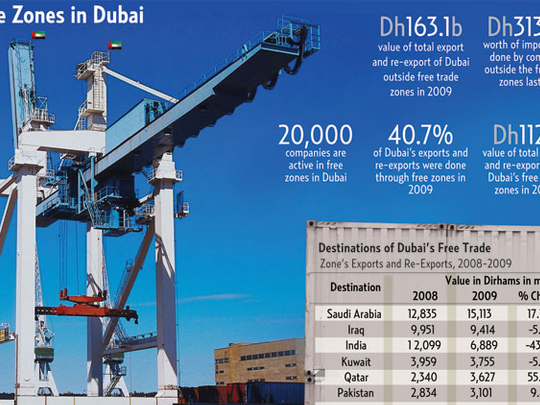
Dubai: Companies within Dubai's free zones have recorded Dh112 billion worth of exports and re-exports last year. This represent more than 40.7 per cent of Dubai's total exports and re-exports in 2009, according to a Dubai Chamber report issued Sunday.
About Dh152.1 billion worth of imports or 32.6 per cent of Dubai's total imports — valued at Dh313.9 billion — were carried out by companies in the free zones in 2009.
Free zones prosper during emergency situations as they can fast-track supplies to troubled regions without the hassles of customs and other formalities.
Although Dubai hosts some 20 free zones with more than 20,000 companies, imports, exports and re-exports mostly takes place through Jebel Ali Free Zone, Technopark and Dubai Airport Free Zone (DAFZ).
Hamad Bu Amim, Director General of Dubai Chamber, said, "Dubai's free zones are a major source of attraction for global companies and firms due to the many advantages they offer to investors looking for all the benefits of operating in the designated free zone areas."
Last week, DAFZ said it had recorded a 63 per cent jump in sale during the first half of this year while Ras Al Khaimah Free Trade Zone reported that 785 companies have already registered for businesses during the first half of the year.
Additional incentive
Dubai has established numerous free trade zones to give businesses an additional incentive to be located there. Initially, free zones were created to attract foreign investment and promote foreign trade, a Dubai Chamber study, issued yesterday, observed.
Dubai's first free zone was launched in the early 1980s when the government commissioned Jebel Ali port — now the main trading hub of the Middle East.
"They were designated areas where special laws operated with regard to ownership, taxation, recruitment of labour, value addition and income repatriation.
As globalisation gained ground, free zones became the preferred areas for foreign investment as they offered the most cost effective mix of factors of production, transportation and distribution," the report said.
Free zones have been attracting investment from foreigner a lot of late, due to the comparative advantages they provide. The UAE's Commercial Companies Law restricts foreign investment in private companies to 49 per cent, leaving them at the hands of the local partners.
Foreigners can not do business without a local partner, a fact that prompted the UAE leaders to offer the free zone option to foreign investors.
Comparative advantages
However, foreigners can own 100 per cent stake in companies within the free zones.
"The comparative advantages of the free zones are attracting more and more foreign investors to the free zones," investment advisor Jitendra Gianchandani, chairman and managing partner of Jitendra Consulting Group, told Gulf News.
"Foreign investors, however, have to invest in non-free zone companies if they have to engage in businesses within the country."
Echoing the same, Raju Menon, managing partner of Morison Menon, an investment advisory firm, told Gulf News, "Those investors who do not need to sell products within the UAE, are opting for free zones — that are attracting more investment.
"However, you can't do business within the UAE territory without a business license issued by the Department of Economic Development."
Bu Amim stressed the importance of the free zones in offering competitive advantage through its strategic location that also eases exports to Asia and Africa.
what is a free zone?
A free trade zone (FTZ) or export processing zone (EPZ) is an area of a country where some normal trade barriers such as tariffs and quotas are eliminated and bureaucratic requirements are lowered in hopes of attracting new business and foreign investments.
It is a region where a group of several countries has agreed to reduce or even eliminate trade barriers.
Free trade zones can be defined as labour intensive manufacturing centres that involve the import of raw materials or components and the export of diverse factory products.
Most FTZs are located in developing countries: Brazil, Indonesia, El Salvador, China, the Philippines, Malaysia, Bangladesh, Pakistan, Mexico, Costa Rica, Honduras, Guatemala, Kenya, and Madagascar have EPZ programmes.
In 1997, 93 countries had set up export processing zones (EPZs) employing 22.5 million people, and five years later, in 2003, EPZs in 116 countries employed 43 million people.
Corporations setting up in a zone may be given tax breaks as an incentive.
— Staff Report












